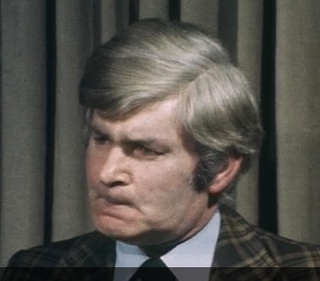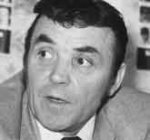
The Ulster Defence Association (UDA) is an Ulster loyalist paramilitary group in Northern Ireland. It was formed in September 1971 as an umbrella group for various loyalist groups and undertook an armed campaign of almost 24 years as one of the participants of the Troubles. Its declared goal was to defend Ulster Protestant loyalist areas and to combat Irish republicanism, particularly the Provisional Irish Republican Army (IRA). In the 1970s, uniformed UDA members openly patrolled these areas armed with batons and held large marches and rallies. Within the UDA was a group tasked with launching paramilitary attacks that used the cover name Ulster Freedom Fighters (UFF) so that the UDA would not be outlawed. The British government proscribed the UFF as a terrorist group in November 1973, but the UDA itself was not proscribed until August 1992.
The Ulster Protestant Volunteers was a loyalist and Reformed fundamentalist paramilitary group in Northern Ireland. They were active between 1966 and 1969 and closely linked to the Ulster Constitution Defence Committee (UCDC) and Ulster Volunteer Force (UVF), established by Ian Paisley and Noel Doherty in 1966.

Ulster loyalism is a strand of Ulster unionism associated with working class Ulster Protestants in Northern Ireland. Like other unionists, loyalists support the continued existence of Northern Ireland within the United Kingdom, and oppose a united Ireland independent of the UK. Unlike other strands of unionism, loyalism has been described as an ethnic nationalism of Ulster Protestants and "a variation of British nationalism". Loyalists are often said to have a conditional loyalty to the British state so long as it defends their interests. They see themselves as loyal primarily to the Protestant British monarchy rather than to British governments and institutions, while Garret FitzGerald argued they are loyal to 'Ulster' over 'the Union'. A small minority of loyalists have called for an independent Ulster Protestant state, believing they cannot rely on British governments to support them. The term 'loyalism' is usually associated with paramilitarism.
The Ulster Loyalist Central Co-ordinating Committee (ULCCC) was set up in 1974 in Belfast, Northern Ireland in the aftermath of the Ulster Workers Council Strike, to facilitate meetings and policy coordination between the Ulster Workers Council, loyalist paramilitary groups, and the political representatives of Ulster loyalism.
The Ulster Workers' Council was a loyalist workers' organisation set up in Northern Ireland in 1974 as a more formalised successor to the Loyalist Association of Workers (LAW). It was formed by shipyard union leader Harry Murray and initially failed to gain much attention. However, with the full support of the Ulster Defence Association (UDA) the UWC became the main mobilising force for loyalist opposition to power-sharing arrangements.

The Loyalist Association of Workers (LAW) was a militant unionist organisation in Northern Ireland that sought to mobilise trade union members in support of the loyalist cause. It became notorious for a one-day strike in 1973 that ended in widespread violence.
The Ulster Army Council of Northern Ireland was set up in 1973 as an umbrella group by the Ulster Defence Association and the Ulster Volunteer Force to co-ordinate joint paramilitary operations during the Ulster Workers' Council Strike. Andy Tyrie was the head of the group – and was also the then commander of the Ulster Defence Association.

Ulster Resistance (UR), or the Ulster Resistance Movement (URM), is an Ulster loyalist paramilitary movement established by the Democratic Unionist Party (DUP) in Northern Ireland in November 1986 in opposition to the Anglo-Irish Agreement.

The Grand Orange Lodge of Scotland, or Loyal Orange Institution of Scotland, Orange Order in Scotland, The Orange Order is the oldest and biggest Protestant fraternity in Scotland. The Loyal Orange Institution was an official participant in the 2014 independence referendum. Its headquarters are in Motherwell, having previously been in Bridgeton, Glasgow with 5,000 members in the Scottish Lowlands.

John Dunlop McKeague was a Northern Irish loyalist and one of the founding members of the paramilitary group the Red Hand Commando in 1970. Authors on the Troubles in Northern Ireland have accused McKeague of involvement in the Kincora Boys' Home scandal but he was never convicted. He was shot dead by the Irish National Liberation Army (INLA) in Belfast in January 1982.
William Hull was a loyalist activist in Northern Ireland. Hull was a leading figure in political, paramilitary and trade union circles during the early years of the Troubles. He is most remembered for being the leader of the Loyalist Association of Workers, a loyalist trade union-styled movement that briefly enjoyed a mass membership before fading.
Andrew Tyrie is a Northern Irish loyalist paramilitary leader who served as commander of the Ulster Defence Association (UDA) during much of its early history. He took the place of Tommy Herron in 1973 when the latter was killed, and led the organisation until March 1988 when an attempt on his life forced him to resign from his command.

Tommy "Tucker" Lyttle, was a high-ranking Ulster loyalist during the period of religious-political conflict in Northern Ireland known as "the Troubles". A member of the Ulster Defence Association (UDA) – the largest loyalist paramilitary organisation in Northern Ireland – he first held the rank of lieutenant colonel and later was made a brigadier. He served as the UDA's spokesman as well as the leader of the organisation's West Belfast Brigade from 1975 until his arrest and imprisonment in 1990. According to journalists Henry McDonald and Brian Rowan, and the Pat Finucane Centre, he became a Royal Ulster Constabulary (RUC) Special Branch informer.

Frankie Curry was a Northern Irish loyalist who was involved with a number of paramilitary groups during his long career. A critic of the Northern Ireland peace process, Curry was killed during a loyalist feud.
Clifford Peeples is a self-styled pastor in Northern Ireland who has been associated with Ulster loyalist activity. Peeples has been a member of the Ulster Volunteer Force (UVF), the Loyalist Volunteer Force (LVF) prisoners' spokesman and leader of the Orange Volunteers. He has taken a prominent role in opposing the Northern Ireland Protocol in the courts.
Down Orange Welfare was an Ulster loyalist paramilitary vigilante group active in Northern Ireland during the 1970s. Operating in rural areas of County Down, the group faded after failing to win support away from larger groups such as the Ulster Defence Association (UDA) and Ulster Volunteer Force (UVF).
Samuel Smyth was a Northern Irish loyalist activist. A founder member of the Ulster Defence Association (UDA) he was the early public face of the movement as the organisation's spokesman, and he later became involved in the group's attempts to politicise. He was assassinated by the Provisional IRA as part of the Troubles. Author Steve Bruce described Smyth as the "sometime editor of the Ulster Militant and a loose cannon who enjoyed an exciting and erratic relationship with the UDA".
The Orange Volunteers (OV) was a loyalist vigilante group with a paramilitary structure active in Northern Ireland during the early 1970s. It took its name from the Orange Order, from which it drew the bulk of its membership.
The Ulster Service Corps (USC) was a loyalist vigilante group with a paramilitary structure active in Northern Ireland in the late 1970s. Although short-lived it briefly had a sizeable membership. One of a number of small independent loyalist paramilitary groups active in the mid 1970s, alongside the Orange Volunteers, Ulster Volunteer Service Corps, Down Orange Welfare and the Ulster Special Constabulary Association (USCA), the USC was the largest of these minor groups.
The Ulster Volunteer Service Corps (UVSC) was an Ulster loyalist vigilante and paramilitary movement active in Northern Ireland during the early 1970s. Initially the steward group for the Ulster Vanguard, under the title Vanguard Service Corps, it continued to exist after becoming independent of that movement.








